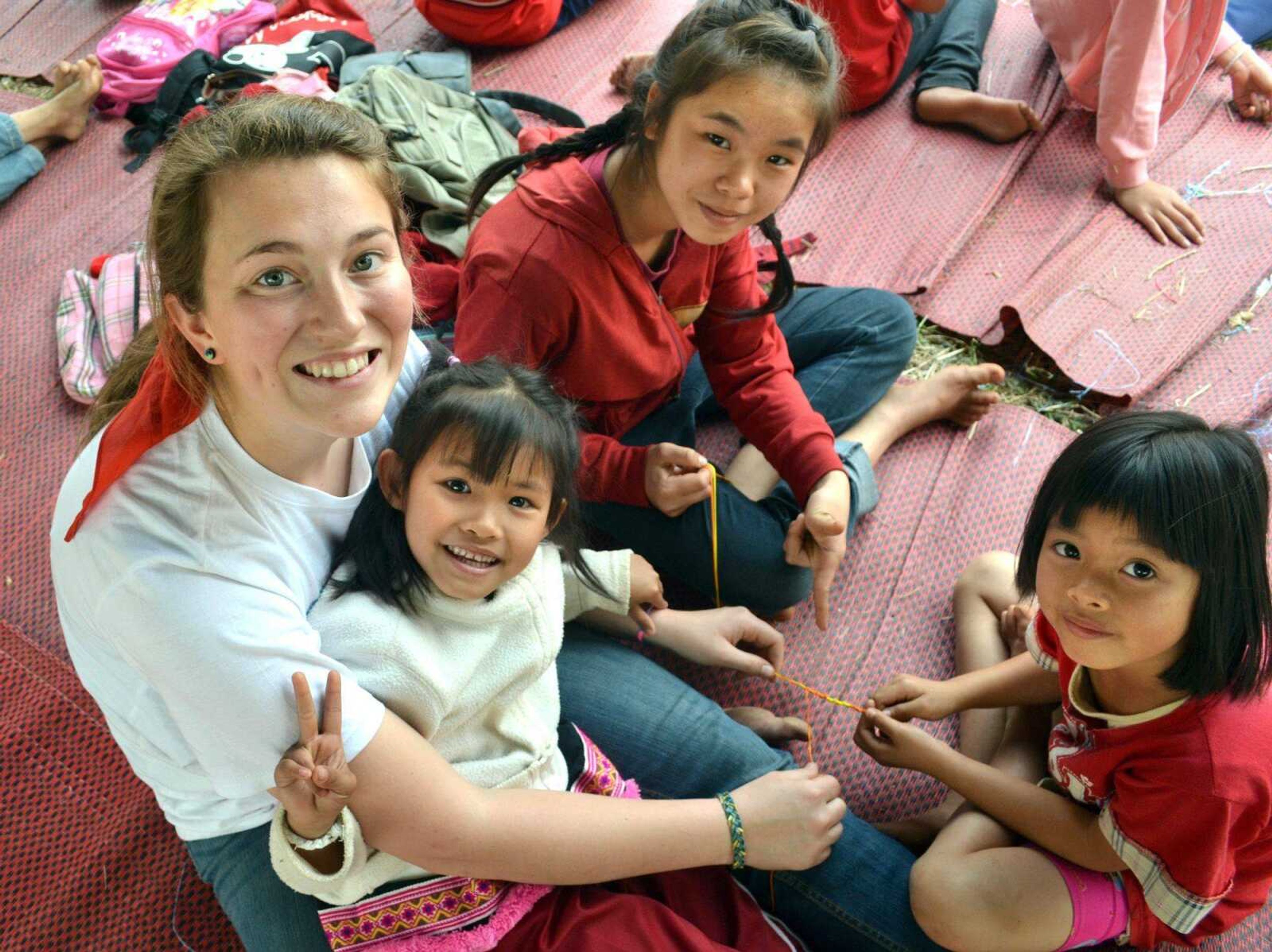Glenallen resident returns from Thailand after helping victims of human trafficking
She saw a possibly horrific future in the Asian eyes of a 5-year-old girl. Later, she saw the heartbreaking results in those who had seen that play out into a terrible reality. During her recent three-week public service trip to Thailand, Felicia Bratti became painfully aware of the toll of human trafficking...
EDITOR'S NOTE: The church Bratti is a member of has been corrected.
She saw a possibly horrific future in the Asian eyes of a 5-year-old girl. Later, she saw the heartbreaking results in those who had seen that play out into a terrible reality.
During her recent three-week public service trip to Thailand, Felicia Bratti became painfully aware of the toll of human trafficking.
The 20-year-old Bollinger County resident joined a group of teenagers from the Unification Church as part of its Generation Peace Academy, a gap-year program between high school and college. The group, which included adult church leaders, divided its time between the cities of Chiang Rai and Bangkok, working first at a school geared toward preventing child exploitation and later for an organization that cares for victims of Thailand's massive sex trade.
"It's not something you see a lot out in the open when you go there," Bratti said. "Most areas look like a business district of a city. People obviously know it's there. But you don't hear about it from your average person."

That was quite a shock to the Glennallen resident, who expected to find rallies and movements to stop the abuse of the country's children, who are sometimes abducted or sold as sex slaves or for cheap labor.
"I expected people to care," she said. "But it's normalized for them. It's not a big deal for them anymore."
Sex trafficking has been called one of the most disturbing global crimes, specifically in the Asia-Pacific area. The industry in Thailand thrives as a $150 billion business each year, dating back to the Vietnam War when Thailand basically became a brothel for American GIs on leave. While Thailand's government bristles at the nickname "brothel of the world," several analysts say the country is home to 150,000 to 220,000 prostitutes, including many minor children.
While it's illegal in Thailand, many massage parlors serve as a front for prostitution and brothel owners have networks of agents combing the villages seeking out troubled families caught up in debt with few options.
"The world is a bigger place now," Bratti said. "It's hard to imagine when you're grocery shopping in your quiet little town that people across the world and even in your own country are being so horribly abused and violated."
Bratti's parents described their daughter as a responsible and mature young woman who is looking to make a difference in the world.
"She has a world view that doesn't just go with fashion or the new thing that comes around the corner," said her father, Kim. "She's really grounded, with morals and values that are beyond current trends. ... She's trying to make an impact on the world, however small that impact may be."
Bratti's mother, Mary, agreed.
Even as a young girl, Mary Bratti said, her daughter showed signs of being a leader.
"She's focused and happy and could easily inspire the kids around her," Mary Bratti said. "She also has a deep and sincere heart to seek out God's will. She was happy and excited to participate. I think it was a learning experience for her."
Once in Thailand, Felicia Bratti's first task was working with the Development and Education Programme for Daughters and Communities, whose founder, Sompap Jantraka, has twice been nominated for the Nobel Peace Prize. The nongovernmental organization works to prevent child exploitation and defends vulnerable minors and their rights.
Bratti described it basically as a school for children -- boys and girls -- more likely to become targets for sex trafficking. These are the country's poor children, often whose parents aren't with them. The school provides permanent shelter and education. The school's website says the program has helped prevent thousands of children from the Mekong subregion from succumbing to the sex industry or other exploitive child labor practices.
Bratti and the others taught different sports, crafts and how to make certain things.
It was, for the most part, like any other school, Bratti said.
But sometimes it would hit her that some of these children may wind up in the sex industry. Some of them were as young as 4 or 5, which is the age that some are abducted. She'd be holding one of them and she'd imagine a horrible scenario playing out.
"Very easily their life could be so full of pain," Bratti said. "They really wouldn't know the difference. That would be the only life they'd know."
While the school touted that only 5 percent of students there would go on to somehow be in the sex trade, that offered Bratti little comfort, she said.
"They said that 95 percent of these kids would be fine," she said. "To me, I was like, that's not OK. That's still 5 percent. Even if only one kid has to go through that, it's not OK. It was hard."
The group later went to Thailand's capital, Bangkok, where Bratti and the others worked with Pavena Hongsakul Foundation for Children and Women, a not-for-profit organization that cares for victims of the sex industry. It was this job, Bratti said, that was "emotionally more difficult" for her. Here, the group came across women who had been repeatedly raped who had come to the center seeking help.
Five children, ages 10 to 12, were also at the center trying to recover after being involuntarily involved in the sex industry.
"They just seemed so happy and sweet," Bratti said. "But they were quiet. You could tell something bad had happened to them. It's hard to think about what they had been through at such a young age. That they could even talk to anyone or trust anyone was just incredible to me."
At the end of her trip, as the people at the center sang a song of unity, Bratti was holding the hand of an 11-year-old girl who she had become especially close to. Bratti broke down.
She said she had never wanted to take someone's pain away so badly before.
"All you want is healing and for no one to have to go through that," she said. "So it was definitely really hard. I cried a lot that night. I think about her a lot."
smoyers@semissourian.com
388-3642
Pertinent address:
Glenallen, MO
Connect with the Southeast Missourian Newsroom:
For corrections to this story or other insights for the editor, click here. To submit a letter to the editor, click here. To learn about the Southeast Missourian’s AI Policy, click here.










